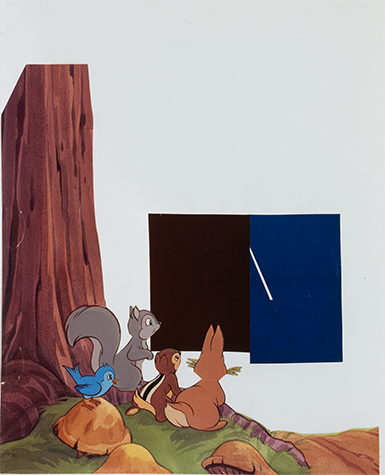Artist Talk: Arturo Herrera
In conjunction with Monochrome Multitudes, the Smart Museum of Art and University of Chicago partners present a quarter-long artist talk series.
Join Arturo Herrera and other exhibiting artists as they consider the rich and sometimes idiosyncratic references and resonances in their own work, while also speaking to the histories of the monochrome and abstraction broadly conceived.
FREE, but space is limited. Advanced registration encouraged »
Arturo Herrera’s artist talk is co-sponsored by the Goethe-Institut.

About the artist
Arturo Herrera’s work includes collage, works on paper, sculpture, relief, wall painting, photography, and felt wall hangings. His work taps into the viewer’s unconscious—often intertwining fragments of cartoon characters with abstract shapes and partially obscured images that evoke memory and recollection. Using techniques of fragmentation, splicing, and re-contextualization, Herrera’s work is provocative and open-ended. Following his MFA degree from the University of Illinois, Chicago, he has had solo and project-based exhibitions at Ikon Gallery, Birmingham, UK; The Art Institute of Chicago; Whitney Museum of American Art, NY; Dia Center for the Arts, NY; P.S.1 Contemporary Art Center, NY; Americas Society Art Gallery, NY; ICA Philadelphia; The UCLA Hammer Museum; Museum of Modern Art, NY; and The Renaissance Society of the University of Chicago. Herrera will be represented in Monochrome Multitudes with a Smart Museum-owned work of cartoon characters contemplating monochrome art.
Schedule
- September 29: Irena Haiduk
- October 6: Arturo Herrera
- October 13: Dan Peterman
- October 20: Sheila Hicks
- October 27: Amanda Williams
- November 3: Byron Kim
- November 17: Haegue Yang
- December 1: Tobias Rehberger
SUPPORT
Support for the Monochrome Multitudes artist lecture series has been provided by the Goethe-Institut and the following University of Chicago partners: Center for East Asian Studies, Center for Latin American Studies, Center for the Art of East Asia, Center for the Study of Gender and Sexuality, Department of Art History, Franke Institute for the Humanities, Institute on the Formation of Knowledge, Open Practice Committee in the Department of Visual Arts, and Wigeland Fund in the Division of the Humanities.

Image: Arturo Herrera, Untitled, 1997–1998, Collage on paper. Smart Museum of Art, The University of Chicago, Gift of Susan and Lewis Manilow, 2006.98.4.
